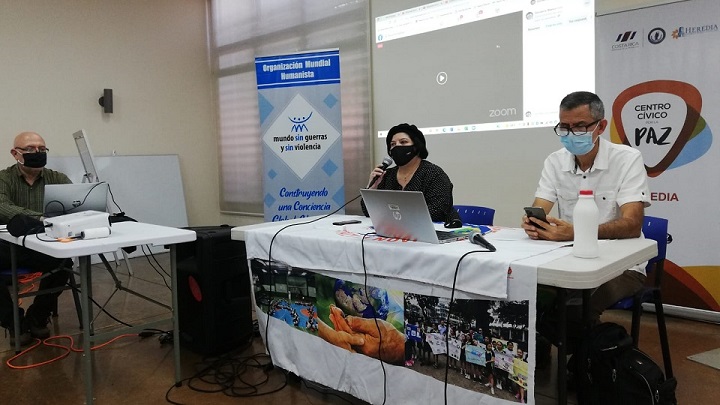The Latin American March closed with the Forum “Towards the nonviolent future of Latin America”.
The Latin American March closed with the Forum “Towards the nonviolent future of Latin America”, which took place in virtual mode via Zoom connection and Facebook broadcast on 1 and 2 October 2021.
The Forum was organised into 6 Thematic Axes against the background of nonviolent positive action, which are described in the following paragraphs:
First day, 1 October 2021
1 – Pluricultural coexistence in harmony, valuing the ancestral contribution of the native peoples and how interculturality can offer us the possibility of incorporating this contribution in the nonviolent future we want for Latin America. Within this section, the discussion took place on the Wisdom of the Native Peoples as a contribution towards the nonviolent future of the region.
Moderator: Prof. Victor Madrigal Sánchez. U.N.A. (Costa Rica).
Speakers:
Ildefonso Palemon Hernandez, from the Chatino People (Mexico).
Ovidio López Julian, Mesa Nacional Indígena de Costa Rica (Costa Rica).
Shiraigó Silvia Lanche, of the Mocovi People (Argentina)
Almir Narayamoga Surui, Paiter Surui People (Brazil)
Nelise Wielewski participated as translator from Portuguese to Spanish.
2 – Friendly, multi-ethnic and inclusive societies for all people and ecosystems:
Towards building Inclusive, non-violent societies with sustainable development.
Creation of legislation and culture for equal rights and opportunities for all excluded, discriminated and immigrant populations.
As well as to guarantee our survival with well-being and that of the different forms of life on the planet.
This was the theme of the discussion Inclusive societies for all people and ecosystems, towards the nonviolent future of Latin America.
Moderated by: José Rafael Quesada (Costa Rica).
Speakers:
Kathlewn Maynard and Jobana Moya (Wamis) Brazil.
Natalia Camacho, (Dirección General de Paz) Costa Rica.
Rubén Esper Ader, (Foro Socioambiental Mendoza) Argentina.
Alejandra Aillapán Huiriqueo, (Wallmapu Community, Villarrica) Chile.
Iremar Antonio Ferreira (Instituto Madeira Vivo) – IMV. – Brazil
3 – Nonviolent proposals and actions that can serve as a model to mitigate the major problems of structural violence in Latin America:
Regional or community proposals for nonviolent solutions, organised for the recovery of spaces and societies in search of reversing the problems of structural violence, economic violence, political violence, as well as violence caused by drug trafficking.
The talk included nonviolent proposals to mitigate structural violence in Latin America.
Moderated by: Juan Carlos Chavarria (Costa Rica).
Speakers:
MEd. Andres Salazar White, (Coneidhu) Colombia.
Omar Navarrete Rojas, Ministry of the Interior of Mexico.
Dr. Mario Humberto Helizondo Salazar, Drug Control Institute of Costa Rica.
4.- Actions in favour of disarmament and in favour of making nuclear weapons illegal throughout the region:
Visibilisation of actions in favour of disarmament, the conversion of the role of armies and police forces in the region, for a preventive citizen police, the reduction of military budgets and the prohibition of war as a means to resolve conflicts, as well as the prohibition and stigmatisation of nuclear weapons in the region.
The presentation was Actions in favour of disarmament in the region.
Moderated by: Juan Gómez (Chile).
Speakers:
Juan Pablo Lazo, (Caravan for Peace) Chile.
Carlos Umaña, (ICAN) Costa Rica.
Sergio Aranibar, (International Campaign against Mines) Chile.
Juan C. Chavarría (F. Transformación en Tiempos Violentos) Costa Rica.
Second day, 2 October
5.- The March for the inner path for personal and social nonviolence simultaneously:
Personal and interpersonal development, mental health and inner peace needed to build nonviolent communities.
A discussion was held on Mental health and inner peace necessary for personal and social nonviolence simultaneously.
Moderated by: Marli Patiño, Coneidhu, (Colombia).
Speakers:
Jaqueline Mera, (Corriente Pedagógica Humanista) Peru.
Edgard Barrero, (Cátedra Libre Martín Baro) Colombia.
Ana Catalina Calderón, (Ministry of Health) Costa Rica.
María del Pilar Orrego (White Brigades of the College of Psychologists) Peru.
Ángeles Guevara, (University of Aconcagua), Mendoza, Argentina.
6.- What Latin America do the New Generations want?
What is the future that the new generations want?
What are their aspirations and how to generate spaces for their expression, as well as to make visible the positive actions that they generate in terms of the creation of new realities?
The conversation was about the exchange of experiences of the new generations.
Moderated by: Mercedes Hidalgo C.P.J. (Costa Rica).
Speakers:
Youth Forum, (Costa Rica).
Youth Commission of Human Rights, Cordoba, (Argentina).
Comité Cantonal de la Persona Jóven de Cañaz, Gte, (Costa Rica).
We are grateful for the efforts of so many speakers, participants and listeners from different countries, Latin American and otherwise, who have made this Forum possible, which from its different aspects has shown that there is a way of seeing and building the world that implies the establishment of cooperative human and social relations based on an attitude of active nonviolence, understanding, respect and cooperation.
In this way, different ethnicities and cultures do not separate populations but, on the contrary, drive them towards an exchange that enriches them in their uniqueness and diversity, strengthening step by step the historical trend that interweaves peoples in the creation of a Universal Human Nation.












